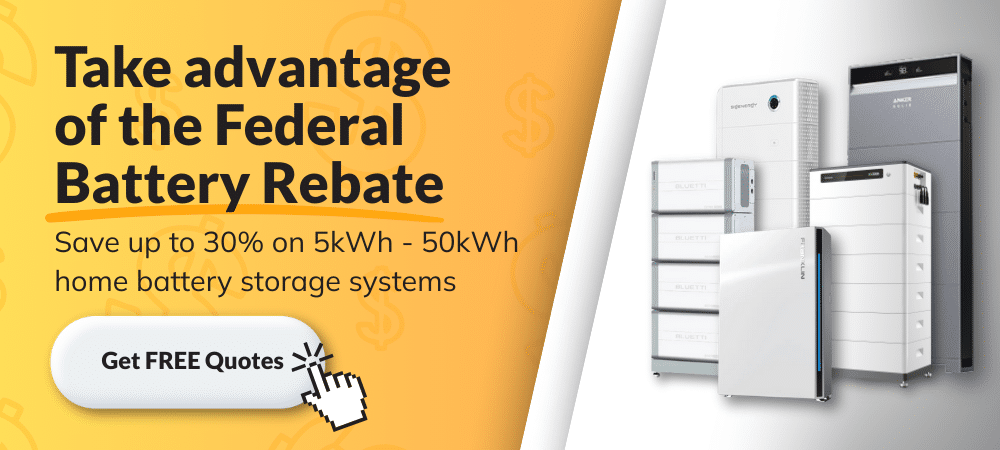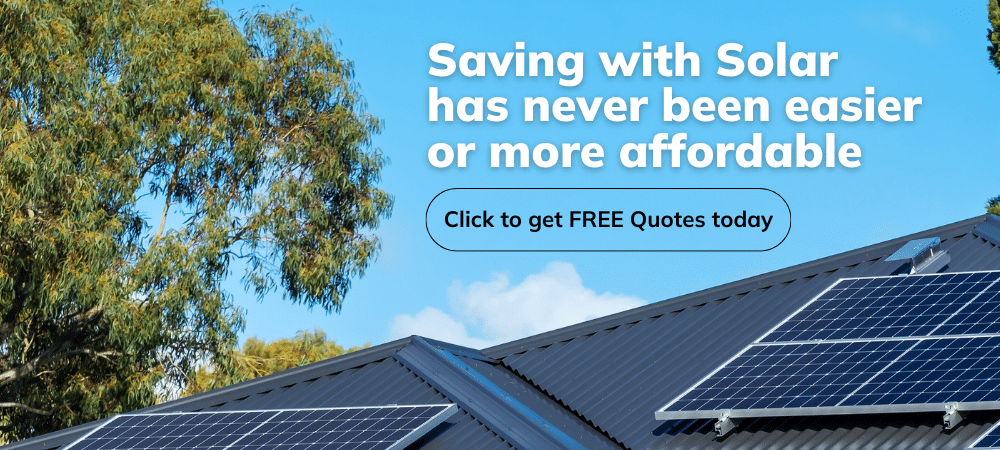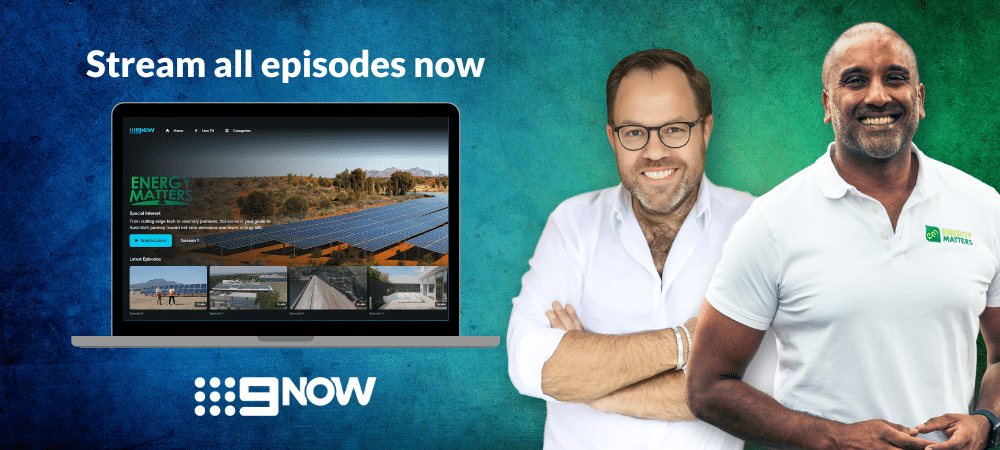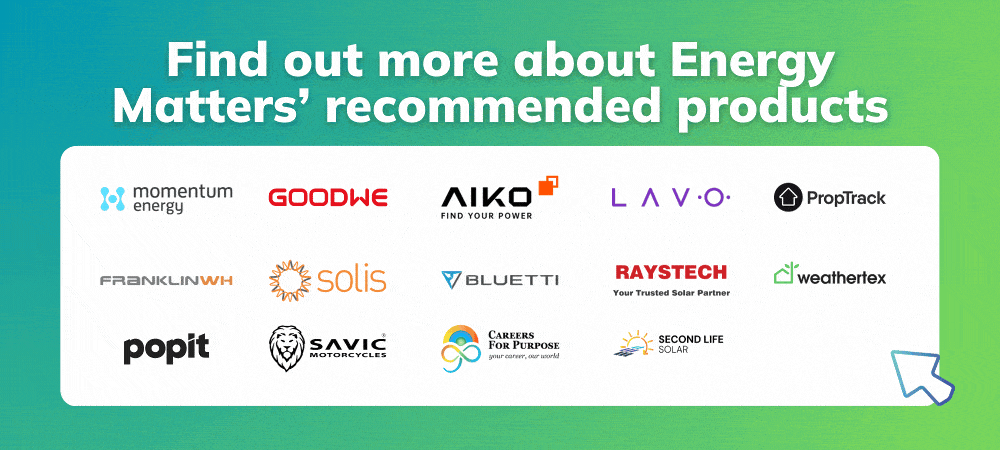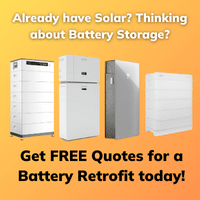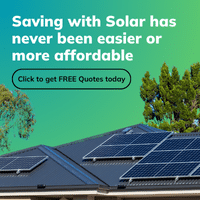In addition to the cost and greenhouse gas emissions savings, the beauty of a solar hot water system is its relative simplicity and durability.
There are two types of collectors in solar hot water services:
- Flat plate collectors (suitable where tank roof mounting is necessary)
- Evacuated tubes (more efficient and great for frost-prone areas)
On this page
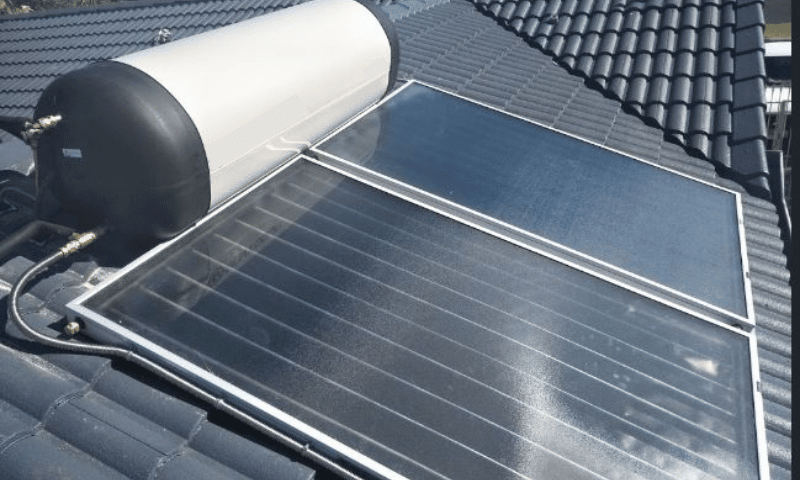
Flat plate solar collector
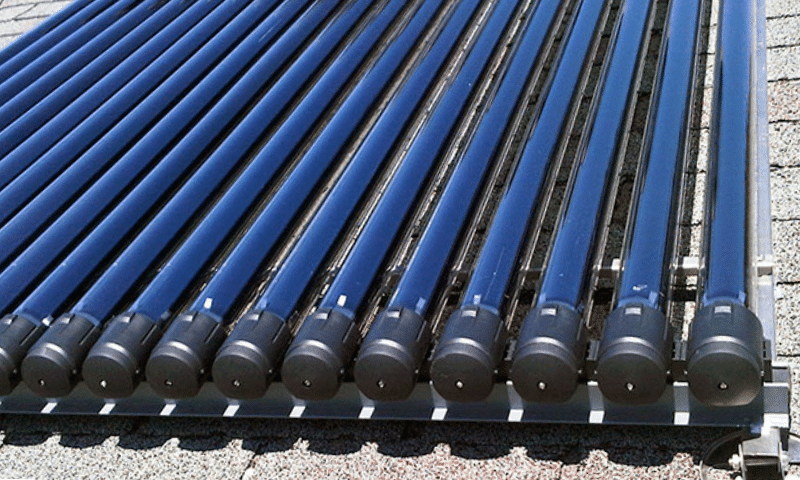
Evacuated tubes
Flat plate solar collectors
Flat plate collectors work on copper pipes running through a glass-covered collector, often connecting to a water storage tank on the roof. The sun heats the copper pipes, and the resulting hot water is thermo-siphoned out of the storage tank.
Evacuated tubes
Evacuated tubes consist of two glass tubes fused at the top and bottom. The space between the two tubes is evacuated to form a vacuum. A copper pipe (called a heat pipe) running through the centre of the tube meets a common manifold. That then connects to a slow flow circulation pump that pumps water to a storage tank below, thus heating the water during the day. The hot water can be used at night or the next day due to the insulation of the tank.
Evacuation tube systems are superior as they can extract the heat out of the air on a humid day and don’t need direct sunlight. Due to the vacuum inside the glass tube, the total efficiency in all areas is higher. There’s also better performance when the sun is not at an optimum angle. This could include times such as when it’s early in the morning or in the late afternoon.
Evacuated tube vs. flat panel – which is more efficient?
The short answer is an evacuated tube. It’s not only more efficient but also more durable and cheaper to repair should there be accidental damage. Learn more about evacuated tube vs. flat plate collectors.
How does solar hot water work?
Understanding how solar hot water works is key to maximising energy efficiency at home. A solar hot water system typically consists of solar collectors (or solar hot water panels), a storage tank, and often a booster system to ensure a steady supply of hot water even on cloudy days. The sun’s energy heats the water as it passes through the collectors, making this an eco-friendly solution for Australian households.
The water tank and thermal mixing
As heat rises, the hot water delivered to the tank from the solar collector comes from the top for use in the house.
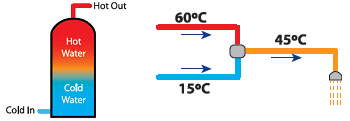
The temperature of the water may exceed 60 degrees Celsius (a requirement to kill bacteria). In order to ensure a safe temperature at the taps, a tempering valve will reduce the temperature to around 45 degrees.
Electric and gas boosters
While the sun can provide sufficient energy to provide you with plenty of hot water for most of the year, there may be extensive periods of cloudy, cold days where your system will need a helping hand. This functionality comes in the form of an electricity boosted or gas booster system.
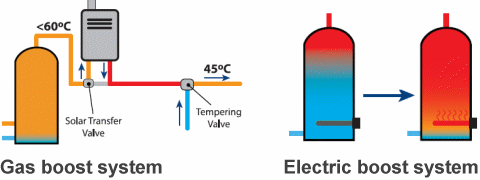
Boosting using a tankless gas water heater is the most efficient method as boosting only occurs when hot water usage occurs. With an electric system, the tank heats as soon as the internal temperature drops.
Solar heat pumps – An energy-efficient alternative
While solar panel hot water systems directly utilise sunlight, a water heat pump is another highly efficient option to consider. These systems extract heat from the surrounding air and transfer it to the water tank, offering a reliable and energy-saving alternative, especially in climates with consistent ambient temperatures. Discover more about the benefits and suitability of water heat pumps for your home.
Hot water and household energy usage
Hot water heating accounts for around 25% of a household’s greenhouse gas emissions and accounts for 15% to 27% of the total energy use of a house. By installing a solar water system in Brisbane, you will reduce these emissions and also save up to 75% of your water heating costs!
Household energy usage (average percentage). Source: https://www.energy.gov.au/households/quick-wins
A gas-boosted solar water heater is the most environmentally friendly hot water system available, due to its low emissions over a 10-year period.
Annual water heating costs comparison
Using the table below, determine the approximate annual cost of water heating with your current unit and what it would cost with a solar hot water system. We have used Melbourne, VIC, as an example. As you’ll see, solar panel hot water system savings are substantial. The information is from Sustainability Victoria: Compare Water Heating Running Costs and assumes energy tariffs in Melbourne of:
Natural gas (2.58 c/MJ 1-2 person household, 2.52 c/MJ 3-4 person household)
LPG (based on bulk supply in the Melbourne area)
Peak electricity (22.88 c/kWh),
Off-peak electricity (16.54 c/kWh)
Energy tariffs do not include the annual supply charge or cylinder rental fee. Melbourne STC solar zones were factored into the solar and heat pump efficiency levels.
Please note:
Gas systems are energy star rated. You can read more about energy star ratings here. The higher the star rating, the more efficient the system will be. This is reflected in the difference of running costs between a lower and higher rated system.
Solar hot water systems do not currently have an energy rating label. The energy rating on each system is industry regulated.
Cost of a solar hot water system
| Water Heater Type | 50L per day 1 person | 90L per day 2 people | 120L per day 3 People | 150L per day 4 People |
|---|---|---|---|---|
| Gas storage - Natural gas (4 to 5 star) | $290 - $250 | $375 - $335 | $440 - $395 | $505 - $455 |
| Gas instant - natural gas (6 to 7 star) | $135 - $125 | $235 - $210 | $310 - $275 | $380 - $340 |
| Gas storage - LPG (4 to 5 star) | $615 - $535 | $800 - $710 | $940 - $840 | $1,080 - $970 |
| Gas instant - LPG (6 to 7 star) | $280 - $250 | $490 - $440 | $645 - $580 | $795 - $715 |
| Electric storage - peak tariff | $340 | $525 | $660 | $795 |
| Electric instant - peak tariff | $265 | $465 | $620 | $770 |
| Electric storage - off peak tariff | $290 | $415 | $505 | $595 |
| Solar/natural gas boosted (high efficiency) | $50 | $75 | $100 | $130 |
| Solar/natural gas boosted (standard) | $60 | $95 | $125 | $160 |
| Solar/electric boosted - peak tariff (high efficiency) | $60 | $125 | $185 | $255 |
| Solar/electric boosted - peak tariff (standard) | $110 | $190 | $265 | $345 |
| Solar/electric boosted - off peak tariff (high efficiency) | $55 | $100 | $150 | $200 |
| Solar/electric boosted - off peak tariff (standard) | $90 | $155 | $210 | $270 |
| Solar/gas - LPG boosted (high efficiency) | $65 | $120 | $170 | $230 |
| Solar/gas - LPG boosted (standard) | $90 | $160 | $225 | $295 |
| Heat pump - peak tariff (high efficiency) | $90 | $135 | $170 | $205 |
| Heat pump - peak tariff (standard) | $125 | $175 | $215 | $255 |
| Heat pump - off peak (high efficiency) | $70 | $100 | $120 | $145 |
| Heat pump - off peak tariff (standard) | $90 | $125 | $150 | $175 |
Unlock government incentives with a hot water rebate
Thanks to various hot water rebate programs across Australia, installing a solar hot water system can be more affordable. These government incentives encourage households to transition to energy-efficient technologies by offering financial support for the installation of solar hot water systems. Taking advantage of these rebates lowers upfront costs and accelerates your return on investment in sustainable living.
These savings, in addition to solar hot water rebates, make the solar hot water system the right environmental move and a financially rewarding one in most circumstances!
Visit our hot water rebate guide to learn more about rebates available in your area and how they can help make your transition to eco-friendly hot water systems more affordable.
Why not make the switch and get a FREE solar quote today! Complete our quick quiz and you’ll be contacted by one of our local installers. Select ‘Other Renewables/Energy Saving’ when prompted.








